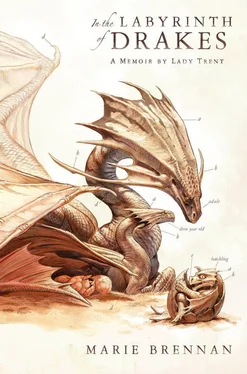I could not bear to have him put down, and told Tom as much. “I can make a scientific argument for it, if you like,” I said while we ate lunch in our shared office. “I’m sure I could come up with quite a splendid one, if you give me a moment to prepare. Something about understanding development by observing both successful and unsuccessful examples. If the abnormality is congenital, we might even have an advance in the captive breeding problem: after all, a dragon too heavy to fly need not have its tendons cut.”

LUMPY
“But none of those,” Tom said, “are your real reasons.”
“Of course not. The truth is that I do not feel the poor creature should die just because someone bungled his care.”
I meant to say more, but hesitated, wiping seasoned yoghurt from my plate with a scrap of flatbread. Tom read my hesitation correctly. “You wonder what kind of life it will be, though.”
A heavy sigh escaped me. “He will never fly. I look at how the grown ones pine… though of course they have known flight, and lost it. Perhaps he would not miss it in the same way. But his health is not good; it is entirely possible that as he grows, it will become worse. Should we condemn him to an earthbound existence, laden with suffering, because of misplaced pity? Is that kinder than giving him a merciful end?”
Tom shrugged helplessly. “How can we judge? We have no way of knowing what he thinks.”
“With a horse or a cat,” I said, “one can tell. Or at least guess. But that is because we know their ways, and can recognize the signs of their moods. My father had a dog who drooped about the house as if she had three paws in the grave already, but she would curl up at his feet and whack her tail occasionally against his shins, and you could see she still took pleasure in his company.” I wondered, but had never asked, what happened to that dog in the end. She had passed, of course—but had it happened naturally, or had the day come when the tail-whacking stopped? Had my father put her down, out of mercy? Had I not been a woman grown, thirty-three years of age, I might have written him to ask for advice.
“There is our answer, perhaps,” Tom said. “Learn their ways, before we make a decision we cannot take back.”
And so Lumpy lived. He never became a true pet; I did not let him out of his pen to follow around at my heels, for fear he might bite those heels off. But I visited him regularly, and brought him choice bits of meat, and did what I could to improve his health. When later events took me away from Qurrat for an extended period of time, I was told that Lumpy became quite dejected—inasmuch as we could discern such things by then. He did not live as long as his species might ordinarily hope for; a desert drake that survives its first three years (during which time many of them are killed by other predators) may hope to see as many as forty, and there are tales of some living far longer than that. Lumpy perished after a mere seven, as his increasing size exacerbated his physical difficulties. But that was a good deal longer than he might have had otherwise; and although I cannot read a dragon’s mind, I believe he enjoyed the time he had.
* * *
Dealing with Lumpy put my mind on thoughts of life expectancy and maturation rates, which were of prime importance to any breeding programme. Indeed, if Lumpy’s continued existence had scientific benefit, it was that he gave me an idea which ultimately proved to have revolutionary consequences.
The problem was this: desert drakes mate but once a year, near the end of the wet season, and lay ten or so eggs. The resulting offspring take approximately five years to reach sexual maturity; they ordinarily do not begin producing offspring until they are seven. Even if Tom and I met with success the moment we arrived and kidnapped every dragon in the desert for our needs, it would have taken years for the breeding programme to reach anything like regular production; and of course we could not be expected to succeed the moment we arrived. That much was understood, and allowed for. But each failed season would mean another year of delay.
In short, we needed to practice on something that bred a good deal faster.
We were making our morning circuit of the pens when the idea came to me. Lieutenant Marton was serving as our interpreter—Tom and I had both studied Akhian, but what one learns from a textbook and what a man speaks on the streets of Qurrat are rather different things—and we were taking notes on what the labourers could tell us of the dragons’ health and behaviour. Before we could make any useful changes, we had to know the current situation inside and out.
But of course I could not stop myself from beginning to form theories and hypothetical scenarios. This put me to thinking about a draconic species that is far less finicky about its mating habits—which gave me an idea. In such a state of excitement that I nearly dropped my notebook into one of the enclosures, I said, “Honeyseekers!”
“What?” Tom said.
“My honeyseekers! Miriam Farnswood can send them to us!”
Tom frowned. Already his nose was peeling from the intense Akhian sun, even at the gentler angle of winter; his Niddey ancestry was simply not suited to this latitude. “And why should she do that?”
“Because they,” I said triumphantly, “will breed like anything. ”
It was not simply that they would breed. The females lay a single egg at a time, but these are watched over by the male honeyseeker; he repeats his mating display until he has what he considers to be a sufficient number of eggs. By removing those eggs when his back is turned, one can persuade him to mate again and again, much more frequently than he would have under ordinary conditions. It is therefore possible, even with just a pair of honeyseekers, to produce a moderately regular supply of eggs—a fact I had discovered when I took one clutch away for dissection.
I had not made much use of this so far, as honeyseekers do not make such good pets that I wanted to send hatchlings to all of my friends. But the man who had gifted my pair to me was Benedetto Passaglia, the great explorer; and he had taken extremely detailed notice of their habits in the wild. Experimentation with those conditions might teach us valuable lessons about egg incubation in draconic species.
“It isn’t going to be anything like a precise match,” Tom said when I was done explaining this to him. (I fear I was somewhat less coherent in the actual moment, producing a great many fragmentary sentences which lacked vital bits of information.) “Honeyseekers aren’t what I would call close cousins of desert drakes.”
They were barely cousins at all, except in the broadest taxonomic sense. As my readers with an interest in dragon naturalism will know, they hail from the eucalyptus forests of Lutjarro, clear on the other side of the world from Akhia. “It would still be data, though,” I said. “And more than we have now.”
“True enough. Let’s speak to Colonel Pensyth, and see if he will arrange for them to be shipped here.”
* * *
Honeyseekers were far from the strangest things we might have asked for; Pensyth acceded to the request without a quibble. We ran into a difficulty, however, with our plans for keeping them.
“They are insectivores when the season requires,” I told Andrew as he escorted me from Shimon and Aviva’s house to Dar al-Tannaneen, “but their primary sustenance comes from eucalyptus nectar. I have a stand of trees in my greenhouse at home—do you suppose it would be possible to uproot one and ship it? Or would the shock of transition kill it?”
Читать дальше













